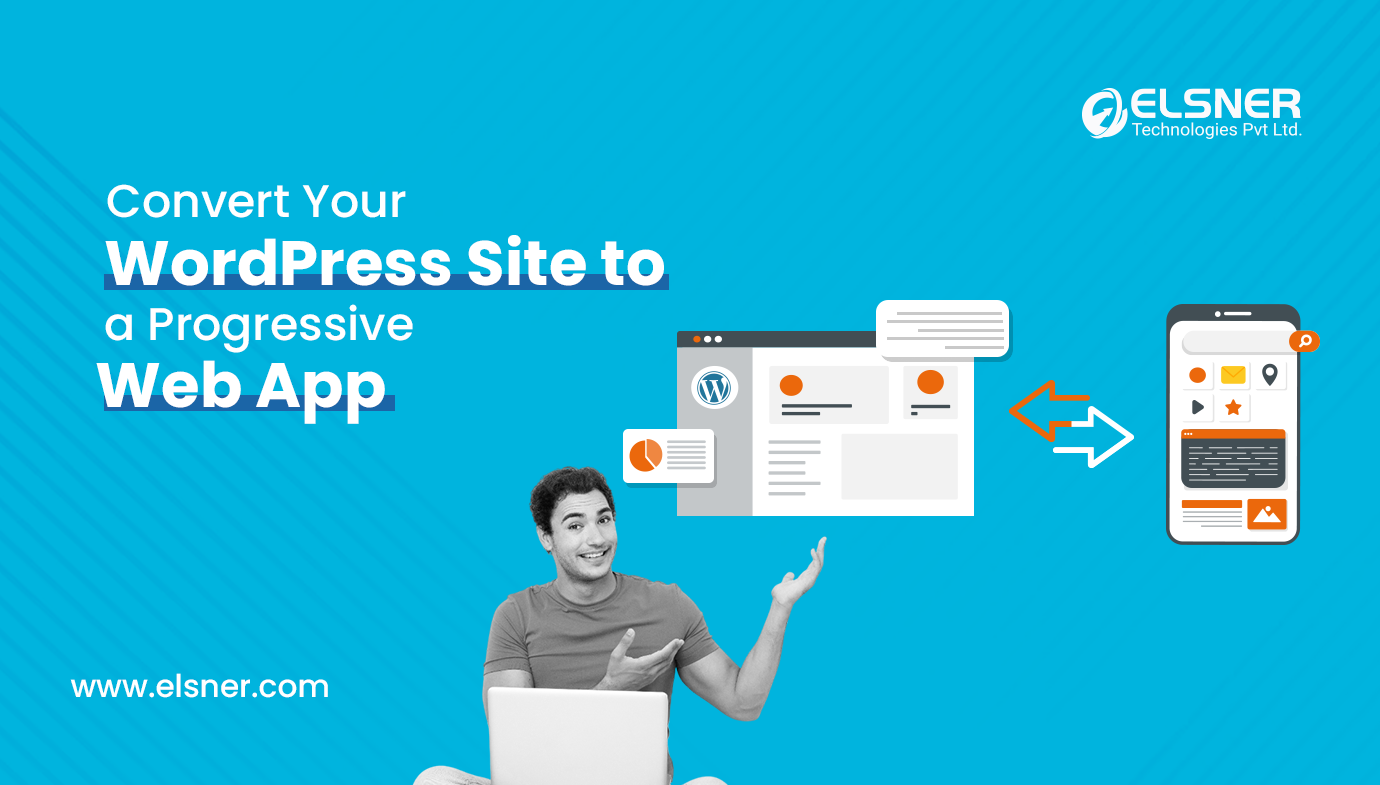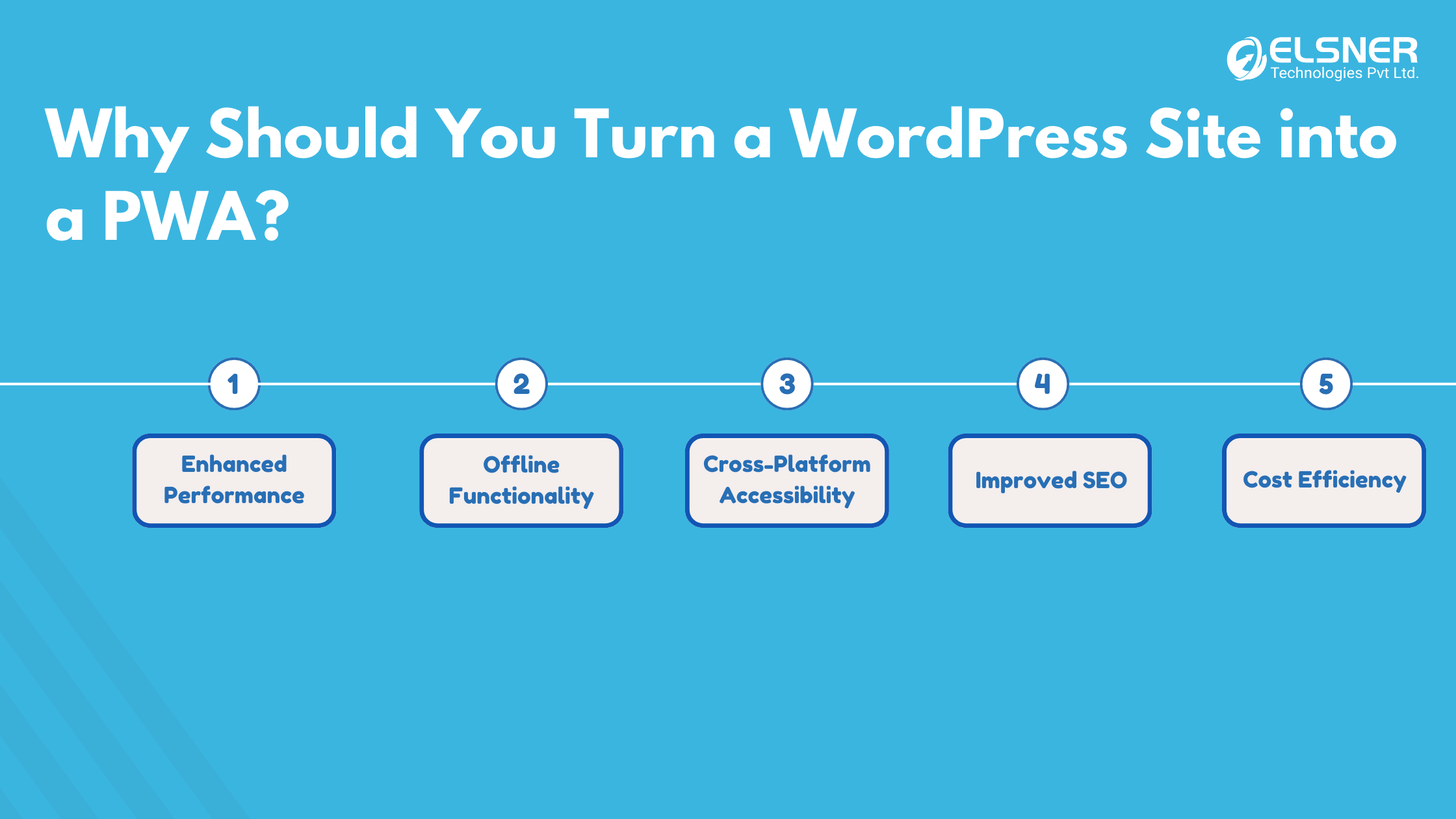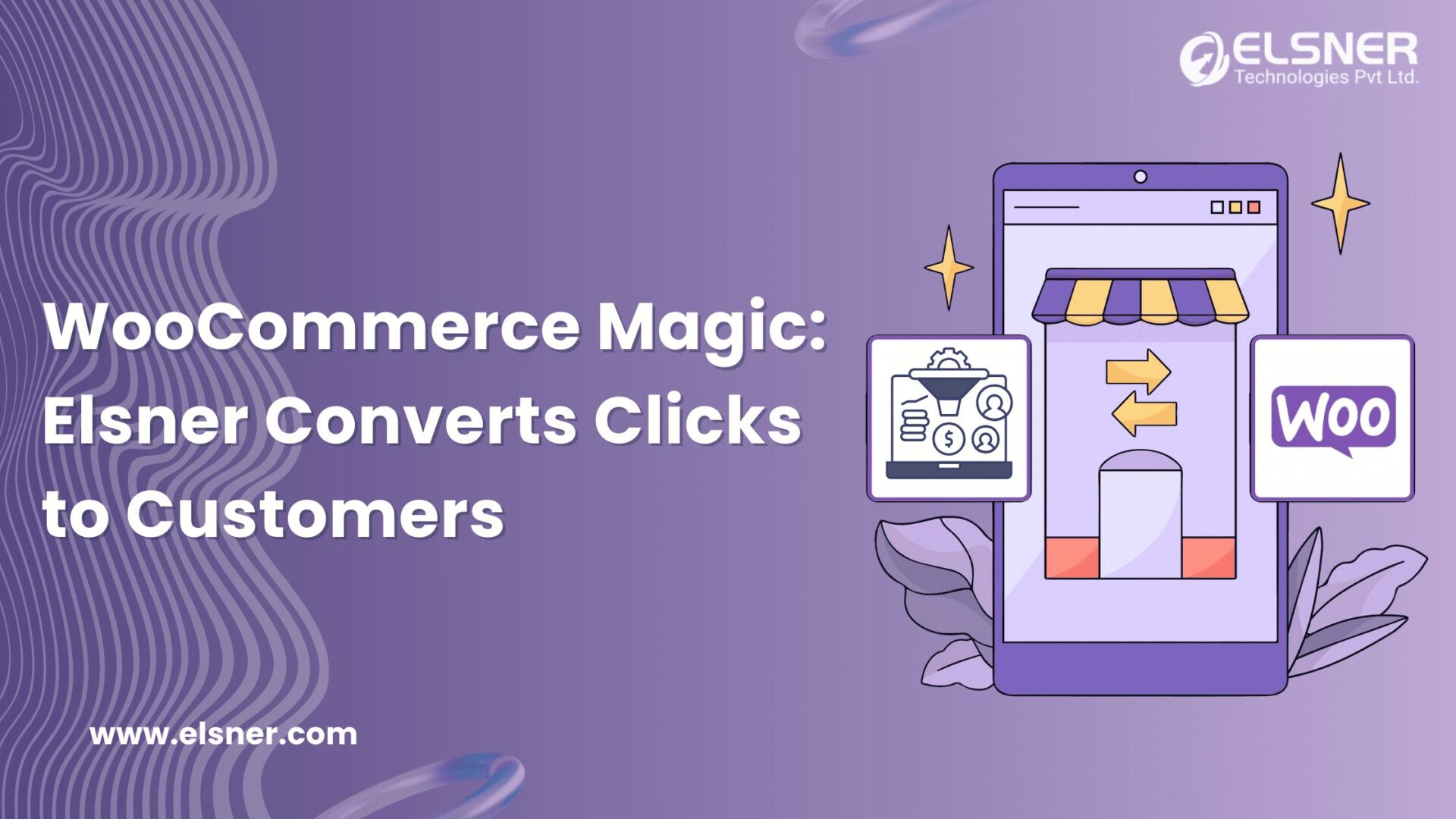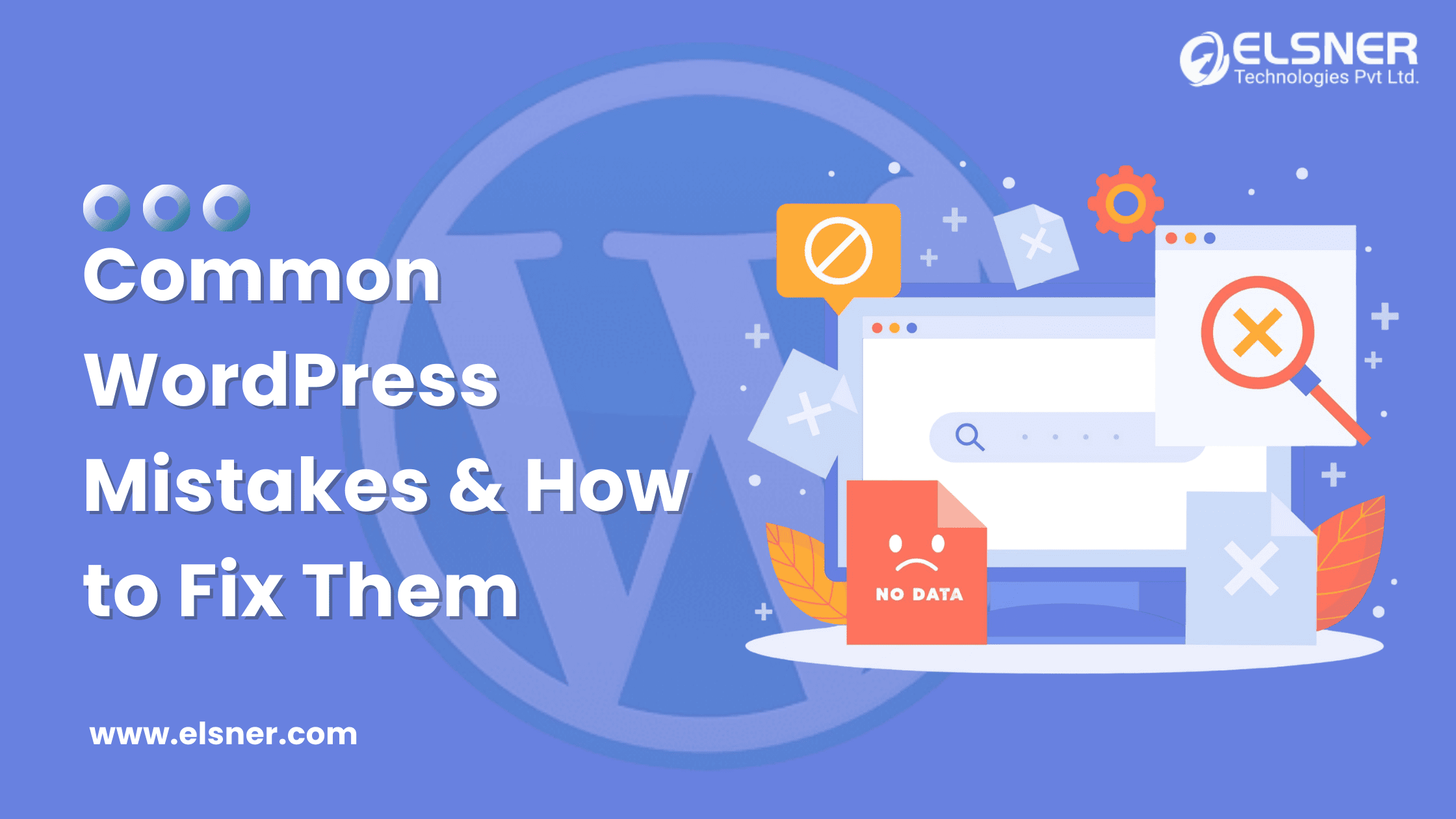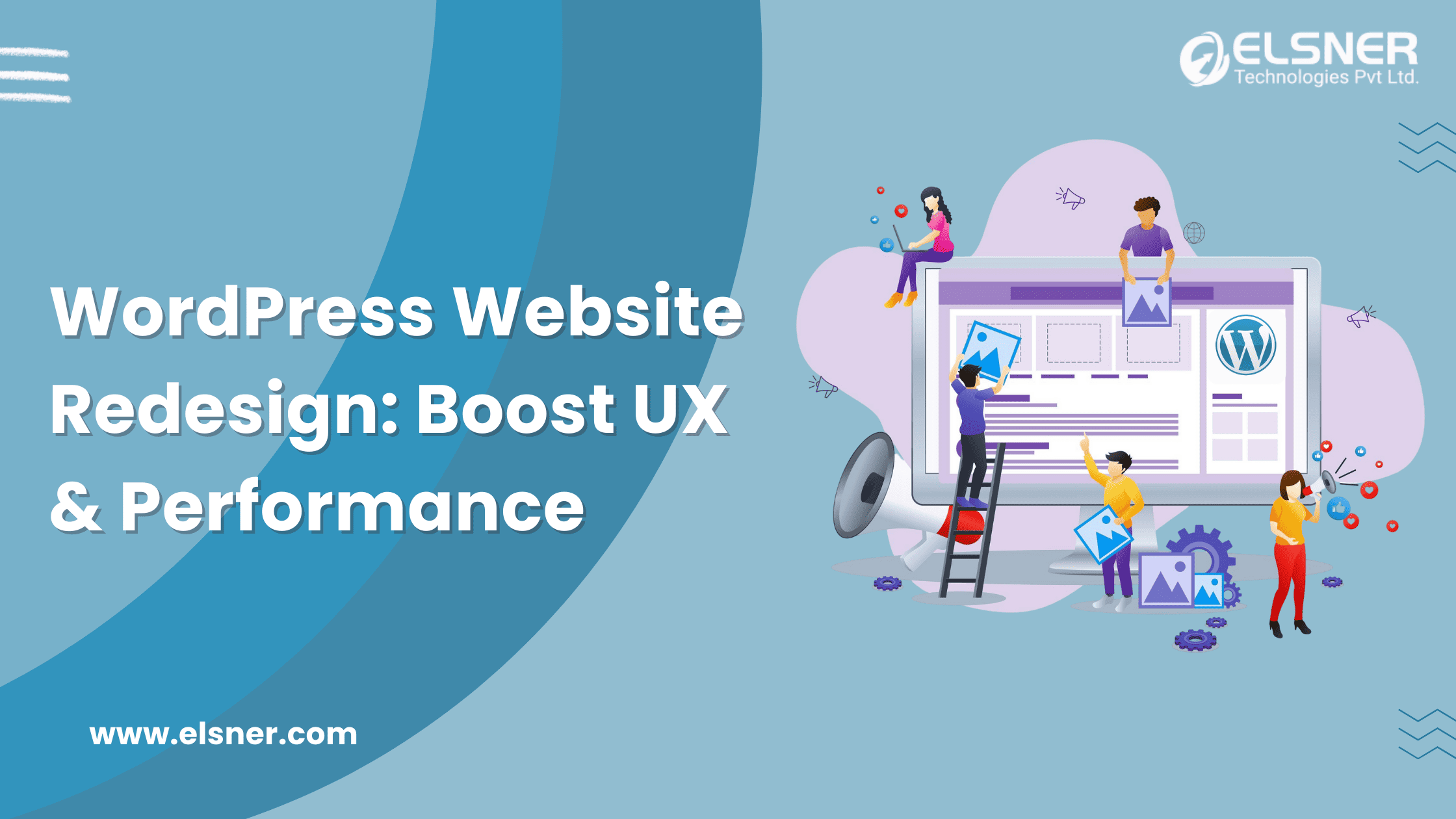- Why Should You Turn a WordPress Site into a PWA?
- 1. Enhanced Performance
- 2. Offline Functionality
- 3. Cross-Platform Accessibility
- 4. Improved SEO
- 5. Cost Efficiency
- Prerequisites for PWA Development in WordPress
- 1. Fundamental Abilities and Understanding
- 2. Principles of UX Design
- 3. Competence in HTML and CSS
- 4. Understanding PHP for Customizing WordPress
- 5. JavaScript for Enhancing Interactivity
- 6. Experience with the WordPress Environment
- Key Skills Required for PWA Development
- How to Build a PWA Using a WordPress Plugin?
- 1. Plan Your PWA Features
- 2. Choose a Reliable Plugin
- 3. Install the Plugin
- 4. Configure Settings
- 5. Test Your PWA
- How to Build a PWA with WordPress from Scratch?
- 1. Secure HTTPS
- 2. Create a Web App Manifest
- 3. Set Up a Service Worker
- Benefits of a PWA WordPress
- Support from WordPress Development Expert
- Conclusion
Imagine your website loading in less than two seconds, working offline, and keeping users engaged with timely push notifications—sounds futuristic, right? The future is already here with Progressive Web Applications (PWAs). As digital trends evolve, businesses that embrace PWAs are witnessing transformative results. In fact, according to a report by Statista, 9% of global traffic is driven by PWAs, showing their growing impact.
“Progressive Web Apps (PWAs) are designed to provide a fast, reliable, and engaging user experience.” – Olha Anurina, an eCommerce content expert at GoMage
So, by making this specific switch, you not only effectively enhance user experience but also position your business at the cutting edge of web technology. From swifter loading times to streamlined cross-device compatibility, PWAs perfectly reshape how we interact with the web. This blog dives deep into why and how to transform your WordPress site into a PWA effectively. Whether you are a seasoned developer or just exploring your options, the insights shared here will guide you toward a smarter digital strategy.
Why Should You Turn a WordPress Site into a PWA?
Every business wants an edge in the digital space. A progressive web app WordPress delivers that and more.
1. Enhanced Performance
PWAs load swiftly, even on poor networks. This makes your web app with WordPress or WordPress web apps accessible to users everywhere.
2. Offline Functionality
With a PWA for WordPress, your site becomes usable offline. Cached content ensures seamless browsing for users without internet connectivity.
3. Cross-Platform Accessibility
PWAs work seamlessly across devices. You do not need separate apps for Android or iOS.
4. Improved SEO
Search engines favor fast, user-friendly sites. A web app with WordPress boosts your visibility and attracts more users.
5. Cost Efficiency
Building a native app can be expensive. Converting your WordPress site into a PWA is more affordable and equally effective.Turning your WordPress site into a PWA is more than an upgrade—it’s a shift towards future-ready technology.
Prerequisites for PWA Development in WordPress
Developing a progressive web application using WordPress requires understanding specific skills and tools. Below are the fundamental prerequisites for creating a PWA for WordPress:
1. Fundamental Abilities and Understanding
Building a progressive web application with WordPress requires core web development skills, including HTML, CSS, and JavaScript, to create and enhance interactive features.
2. Principles of UX Design
A great user experience is essential when building WordPress web apps. UX design principles help make your application responsive and intuitive. An engaging design ensures that your web app WordPress caters to user needs effectively.
3. Competence in HTML and CSS
HTML and CSS are the foundation of web development. These skills help in structuring and styling WordPress web apps, ensuring that your web app with WordPress looks professional and functions seamlessly.
4. Understanding PHP for Customizing WordPress
PHP powers the WordPress ecosystem. Customizing wordpress themes and plugins requires PHP expertise, which is crucial when creating a tailored PWA WordPress experience.
5. JavaScript for Enhancing Interactivity
JavaScript is vital for creating dynamic interactions. A progressive web application relies on JavaScript to implement service workers and improve interactivity in WordPress web apps.
6. Experience with the WordPress Environment
Familiarity with themes, plugins, and configurations is necessary. For complex projects, consider engaging a WordPress development company or using custom WordPress development services to streamline the process.
Key Skills Required for PWA Development
| Skill Area | Why It Matters |
| HTML & CSS | For structuring and styling your PWA |
| PHP | To customize WordPress themes and plugins |
| JavaScript | For adding service workers and interactivity |
| UX Design | Ensures a user-friendly experience |
| WordPress Environment | Familiarity with plugins and themes |
Having these skills will simplify the process of building a PWA for WordPress. If needed, you can hire dedicated WordPress developers for this task.
How to Build a PWA Using a WordPress Plugin?
Plugins make it easy to convert your WordPress site into a progressive web app with WordPress. Here is a step-by-step guide to help you get started.
1. Plan Your PWA Features
Before diving in, decide what your PWA for WordPress should include. Features like offline browsing, a splash screen, and push notifications enhance user experience.
2. Choose a Reliable Plugin
Several plugins simplify the process of creating WordPress web apps. Popular options include SuperPWA and PWA for WP.
3. Install the Plugin
Go to your WordPress dashboard. Install and activate your chosen plugin.
4. Configure Settings
Access the plugin settings to define your app’s name, theme color, and display options. Adjust these settings to align with your brand identity.
5. Test Your PWA
Use tools like Lighthouse to evaluate your PWA. These insights help refine the performance of your web app WordPress site.
| Plugin Feature | Purpose |
| Manifest Configuration | Defines app details like name and icons |
| Service Worker Setup | Enables caching and offline features |
| Push Notifications | Boosts engagement by sending updates |
How to Build a PWA with WordPress from Scratch?
For greater control, building a PWA from scratch is an excellent choice. This approach requires a deeper understanding of web development.
1. Secure HTTPS
PWAs need a secure connection. Ensure your WordPress website has an SSL certificate.
2. Create a Web App Manifest
The manifest file provides browsers with key app details.
“name”: “My PWA WordPress Site”,
“short_name”: “PWA”,
“start_url”: “/”,
“display”: “standalone”,
“background_color”: “#ffffff”,
“theme_color”: “#333333”
}
▲
Add this file to your WordPress root directory.In case you are struggling anywhere, all that you need is to reach out to a reputed agency who holds expertise in offering cutting-edge WordPress website development services.
3. Set Up a Service Worker
Service workers power offline functionality. Use JavaScript to define caching rules.
Event.wait Until(
caches.open(‘static-cache’).then(function(cache) {
return cache.addAll([‘/index.html’, ‘/styles.css’]);
})
);
});self.addEventListener(‘fetch’, function(event) {
event. respond with(
caches.match(event.request).then(function(response) {
return response || fetch(event.request);
})
);
});
▲
Upload this script to your site and activate it.
Benefits of a PWA WordPress
 A PWA WordPress goes beyond standard websites. It bridges the gap, especially between the web as well as app experiences.
A PWA WordPress goes beyond standard websites. It bridges the gap, especially between the web as well as app experiences.
| Feature | Traditional Site | PWA |
| Offline Access | No | Yes |
| Speed Optimization | Moderate | High |
| Push Notifications | No | Yes |
| Device Compatibility | Web-only | Cross-platform |
With progressive web applications, you are not just building a site—you are creating a powerful user experience.
Support from WordPress Development Expert
Developing a PWA requires expertise. If you lack the technical skills, consider working with a WordPress development company. They offer custom WordPress development services tailored to your needs. You can even hire dedicated WordPress developers in order to get the best aid related to building a feature-rich web app WordPress solution.
For businesses focused on online retail, WordPress development services can integrate PWA features seamlessly into your store. You can build a PWA without compromising on quality by leveraging these services.
Conclusion
Thus, progressive web applications are known for perfectly representing the future of web development. They merge the best aspects of websites and apps to deliver unparalleled user experiences. By converting your WordPress site into a PWA, you position your business as innovative and forward-thinking.
Whether you use plugins or build from scratch, the benefits are undeniable. Faster load times, offline functionality, and app-like features enhance both user engagement and business success. Start your journey today—and secure your place in the future of the web.

About Author
Pankaj Sakariya - Delivery Manager
Pankaj is a results-driven professional with a track record of successfully managing high-impact projects. His ability to balance client expectations with operational excellence makes him an invaluable asset. Pankaj is committed to ensuring smooth delivery and exceeding client expectations, with a strong focus on quality and team collaboration.

